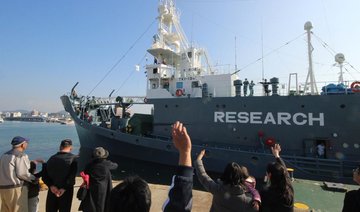SYDNEY: Australia Thursday vowed to “vehemently” oppose a new push by Japan to undermine a global moratorium on commercial whaling, and urged like-minded nations to stand firm against Tokyo.
Japan has regularly sought an easing of the International Whaling Commission’s (IWC) prohibition on commercial whaling and continues to kill the animals under what it calls a “scientific research” program despite international criticism.
At September’s IWC meeting in Brazil, Tokyo has said it plans to “propose setting a catch quota for species whose stocks are recognized as healthy by the IWC scientific committee.”
Australian Foreign Minister Julie Bishop said she was concerned by the proposal.
“We strongly support the 30-year global moratorium on commercial whaling and will vehemently oppose any attempts to undermine the processes that support it,” she said.
This included “through changed voting regimes or the establishment of catch-limits for commercial whaling.”
“At the commission meeting in September, Australia will be calling on like-minded nations to reject Japan’s proposal,” she added.
Hideki Moronuki, an official in charge of whaling at Japan’s fisheries agency, said in June the proposal would not specify which whale species and how many mammals Japan wants to hunt.
But he said the IWC classifies several species as no longer depleted.
Japan also plans measures to change the body’s decision-making process, lowering the threshold for proposals to pass from three quarters of members to half.
Tokyo claims its “scientific research” is necessary to prove whale populations are large enough to sustain a return to commercial hunting, but Bishop said this was not correct.
“The science is clear, you do not need to kill whales in order to study them,” she said.
Japan makes no secret of the fact that meat from the expeditions ends up on dinner tables, despite a significant decline in the popularity of whale meat.
During its most recent annual whale hunt, Japan reported it caught 333 minkes, 122 of which were pregnant, sparking outrage among conservationists.
Japanese officials said the high rate of pregnant whales showed the strength of the minke population.
Australia to ‘vehemently’ oppose Japan push to ease whaling ban
Australia to ‘vehemently’ oppose Japan push to ease whaling ban

- Japan has regularly sought an easing of the International Whaling Commission’s prohibition on commercial whaling and continues to kill the animals
- ‘The science is clear, you do not need to kill whales in order to study them’
Trump threatens military operation against Colombia, after Venezuela raid

- Trump told reporters aboard Air Force One, in an apparent reference to Colombia’s President Gustavo Petro
ABOARD AIR FORCE ONE: US President Donald Trump on Sunday threatened military action against Colombia’s government, telling reporters that such an operation “sounds good to me.”
“Colombia is very sick, too, run by a sick man, who likes making cocaine and selling it to the United States, and he’s not going to be doing it very long,” Trump told reporters aboard Air Force One, in an apparent reference to Colombia’s President Gustavo Petro.
Asked directly whether the US would pursue a military operation against the country, Trump answered, “It sounds good to me.”
The comments came after the United States captured Venezuelan President Nicolas Maduro in an audacious raid and whisked him to New York to face drug-trafficking charges.













